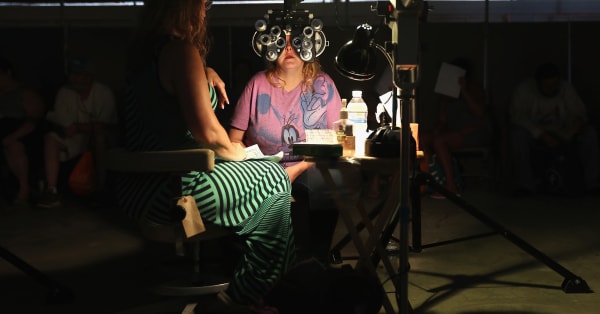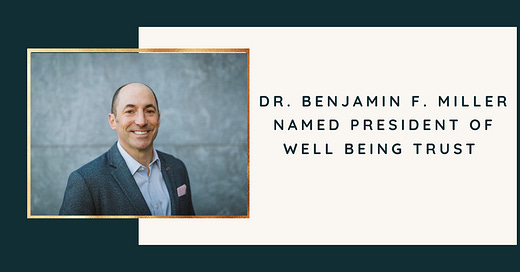Personal News, Plus Ponderings on a Public Option
With some states choosing to start implementing their own, here’s a mistake we must help them avoid.
I won’t spend too much time writing about this in this post, but I feel I owe it to you to share the following news in case you missed it on Twitter:
I’m stepping into a new role at Well Being Trust and could not be more honored or energized by this increased opportunity to make a real-world difference on America’s mental health and addiction crisis. There’s a lot that Well Being Trust has wisely and meaningfully invested to move the needle on mental health and addiction already, and it’s my goal going forward to make sure that thousands, if not millions more Americans benefit from that.
But enough about me. In this post, I want to highlight the fact that over the last few weeks, many have speculated whether President Biden will begin to put in place the health care plan he campaigned on – a Medicare-like public option.


No doubt, we will see more talk of public option health plans – if not immediately at the national level, most certainly at the state level. Washington decided to pass its own public option, Cascade Care, in 2019. And within days of each other, Nevada and Colorado both followed suit this past month.


As The Wall Street Journal recently pointed out, what we are seeing happen in Washington, Nevada and Colorado could very well be the “future of U.S. healthcare.” Like I’ve said before, change often happens from the ground up, and if our states are creating and embracing their own public option health plans rather than waiting for a federal plan, that says something.
However, like I alluded to last week, leaders would be squandering this awesome opportunity to expand coverage for mental health and addiction if they built their public option plan off of Medicare. Why? Because between the Affordable Care Act, Medicare and Medicaid, Medicare provides the worst support for people struggling with mental health and addiction.
WAIT, WHAT MAKES MEDICARE SO BAD?
People love Medicare, and for that and a handful of other factors, there’s good reason to consider using it as a mechanism for expanding coverage.
However, the problem with Medicare – to make a long and kind of complex story short – is that it isn’t a role model mental health plan because it is not beholden to the 2008 Mental Health Parity and Addiction Equity Act (Federal Parity Law), it doesn’t protect kids the way Medicaid does via the Early Periodic Screening, Diagnosis, and Treatment (EPSDT) mandate, and to make matter worse, it’s laden with discriminatory practices.
For starters, it only covers 190 days of care for Medicare beneficiaries needing inpatient psychiatric hospital visits – ever. 190 days of covered care are expected to last a Medicare beneficiary, someone who is older than 65 or who has a disability, their entire lifetime … even though the average length of stay is around 10 days per incident; 80% of inpatient psychiatric facility discharges are for chronic conditions like schizophrenia, depression or other episodic mood disorders; and there’s a 15% readmission rate within 30 days.
What’s more, Medicare limits what kind of care beneficiaries are eligible to receive, particularly mental health crisis or team-based services. This includes quality interventions such as Coordinated Specialty Care (CSC), Assertive Community Treatment (ACT) and medical nutrition therapy for eating disorders, as well as Intensive Outpatient Programs and psychiatric Residential Treatment programs for persons over 20 years old with psychiatric or substance use disorder needs.
Medicare also limits from whom beneficiaries can receive care. Licensed Professional Counselors (LPCs) and Marriage and Family Therapists (MFTs) are not allowed to bill Medicare –see my earlier post about the American Families Plan to understand why the latter does, indeed, have an impact – and peer services and Certified Community Behavioral Health Clinics (CCBHCs) are excluded too.
WHAT CAN I DO ABOUT IT?
As always, there’s something you can do to make sure that these discriminatory practices aren’t adopted for the sake of simplicity. In this case, it just depends on where you are.
If you’re in a state that has already implemented its own public option health plan, like Washington for example, you can start digging into what kind of mental health and substance use coverage is included in that plan. If you haven’t yet, check out Health Care Coverage for the Relentless for information on understanding what you’re reading and knowing what to look out for, then reach out to your local representatives if you find that coverage to be lacking.
If you live in a state that is planning to implement its own public option health plan – I’m looking at you, Coloradans and Nevadans – the opportunity is particularly ripe for some timely and insightful outreach. As I said in my Senate testimony to Sen. Bennet (D-CO), there’s a lot that can be done with a public option to support mental health, but it requires us to be thoughtful and intentional.
Finally, if you live in state where a public option health plan has been shot down – cue Connecticut – or where there are only murmurings of introducing the states own public option, you can do two things. First, like your fellow advocates in states that already have a plan in the works, write to your local leaders and perhaps work with them to come up with an appropriate proposal. (See here for a refresher on how policymaking happens.) Second, consider weighing in on – or helping your state representatives weigh in on – the Request for Information on what should be included in the national public option proposal that Congressman Frank Pallone, Jr. (D-NJ) and Senator Patty Murray (D-WA) plan to close by the end of the month.
Medicare doesn’t just need better vision and dental benefits, as Sen. Bernie Sanders (I-VT) and Sen. Chuck Schumer (D-N.Y.) pointed out recently. Medicare needs better mental health and substance use benefits too – rendering it one of the worst-possible plans to perpetuate in our future health care system.







